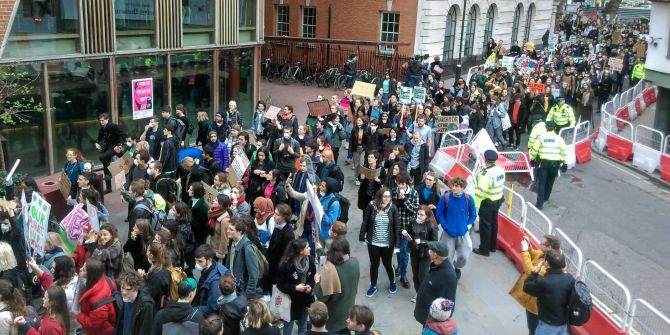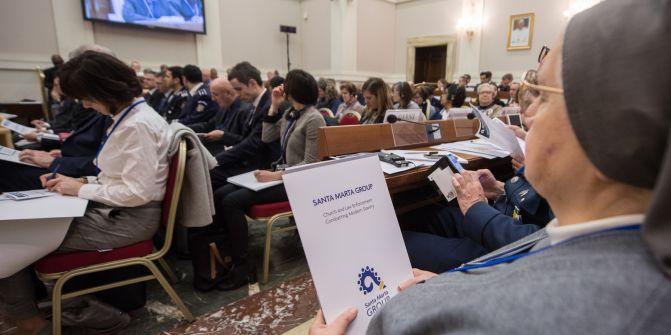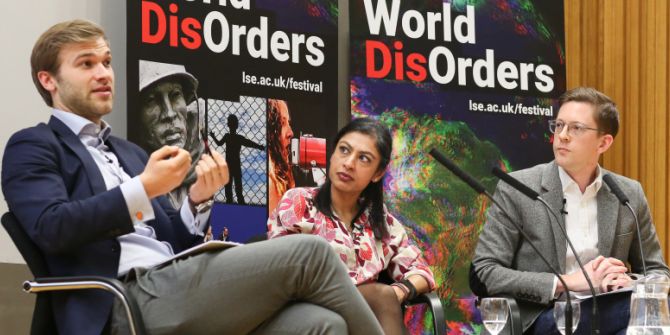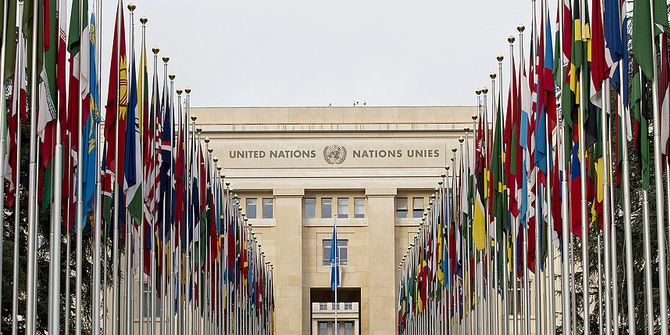With the climate crisis galvanising people around the world, what role can faith communities play in pushing for genuine change? Here, Angharad Thain introduces the LSE Faith Centre’s brand new Faith and Climate Action programme. She also reflects more broadly on the challenges ahead and how both LSE and London’s many faith communities can continue to advocate for a cleaner and greener world.

It has been just over a year since Greta Thunberg sat alone one Friday outside the Swedish Parliament to protest the climate crisis. In the time since, #FridaysForFuture has become a global movement spanning continents and encompassing millions of people. Greta didn’t start this work – activism for the protection and survival of indigenous lands is years old – and she will not be the only one to bring it forward. But she has become a symbol of a generation that has no choice but to press for urgent, radical change, the depth of which we cannot currently envisage but which we must start working towards.
LSE has long contributed to this work through the Grantham Research Institute on Climate Change and the Environment and its chair, Lord Stern, author of the Stern Review on the Economics of Climate Change. LSE has just finalised its new strategy, LSE 2030: Shape the World. If we are serious about this title, the climate crisis needs to be at the forefront of our conversations as a global institution.
And so this year at the LSE Faith Centre we have been asking what our role is in this envisioning and action. As a centre that focuses on interfaith leadership, building relationships and transforming attitudes across faiths, and the role of religion and global society, it became clear that one of our programmes needs to focus on addressing this major issue of our time.
Extinction Rebellion, the school strikes and global climate activism cannot just be a secular movement. Faith communities have unparalleled social capital that can be mobilised on all issues – from refugees, to poverty, and global humanitarian aid. Faith groups are also major voices on both sides of the climate debate, from climate denial to Pope Francis’s second encyclical, Laudato Si (subtitled ‘on care for our common home’). Our challenge is to work in a language that speaks to faith communities across denominations and meets people where they are at in terms of climate action, activism and engagement.
There are also urgent and overdue conversations that need to be had about the inclusivity of Extinction Rebellion and the climate movement in general. Climate justice is about economic justice and racial justice. At its heart it is a radical re-imagining of how we interact with our natural world and with each other. And public, disruptive protests like we are seeing this week in London are not morally clear cut. It is not easy to see ambulances unable to cross bridges, and hear the difficulties of those who rely on buses to travel to early shifts; London bridges are vital for cheap transport and cutting off those travel routes affects the most vulnerable in our society.
But this 2019 wave of activism around the world is having an impact like nothing else has done before. As Ed Miliband said at LSE on 9 October, ‘it has shifted the sense of what is possible and what we can ask for; going net zero by 2050 was once considered a radical option – now it is conservative.’ People are taking notice. James Murray of BusinessGreen commented that big business is ‘terrified’ of the school strikes – they are their future staff and investors. So ultimately the current wave of climate activism is not without flaws. As Farhana Yamin, international lawyer, environmental activist and Extinction Rebellion member said at the same event, ‘in a crisis you co-create the solution and walk the walk together.’ But it is working, and it needs to continue. Faith communities must play a vital role in this protest and bring fresh energy and wisdom to the conversation.
If you are interested in getting involved, here are a few options:
- Be inspired. Go back to your scriptures and connect with the richness of our traditions and how they can galvanise us for action. Religious Imaginations offers a chapter on Religion and Sustainability, and Religion and the Public Sphere offers a dialogue between Rowan Williams and Bruno Latour on Religion and the Environment.
- Start conversations in your faith community. Use this moment to open conversations across backgrounds and generations in your church, synagogue, mosque, temple, gurdwara. This issue is for all of us. Is this a teaching theme already? Can you start it?
- Think structurally. Do some research about what is being done by your faith to reduce environmental impact. There are eco-initiatives across faiths that you can draw from and build on. Check out EcoSikh, EcoChurch, EcoSynagogue and Europe’s first EcoMosque in Cambridge.
- Think politically. Yes, this work has an individual aspect to it. We all need to think about our diets, our travel, our clothes purchases, our energy providers. These are absolutely personal decisions that we have a duty to start changing if we are serious about putting faith into action on this issue. But that is not enough here. This issue has to be mainstreamed as an emergency policy issue this year. What does your local MP say about climate policy? Find out where your MP stands on these issues. Ask them their plans if elected. Tell your faith community what you find out.
- Get plugged into faith-based actions. Have a look at Faith for the Climate Network, an interfaith network of 170 faith-based organisations and individuals working on climate change who have been at Trafalgar Square this week and heavily involved in the Faith Bridge on Lambeth Bridge. The network is made up of groups across faiths, united by their desire to put their faith into action and tell the truth about the detrimental impact climate change is having on creation.
- Pray. We need the energy and the will to achieve the improbable at present. It’s going to be a long road to change.
Note: Faith and Climate Action starts for LSE students this Wednesday evening. You can follow updates on twitter @LSEFaithCentre.
Note: This piece gives the views of the author(s), and not the position of the LSE Religion and Global Society blog, nor of the London School of Economics.





